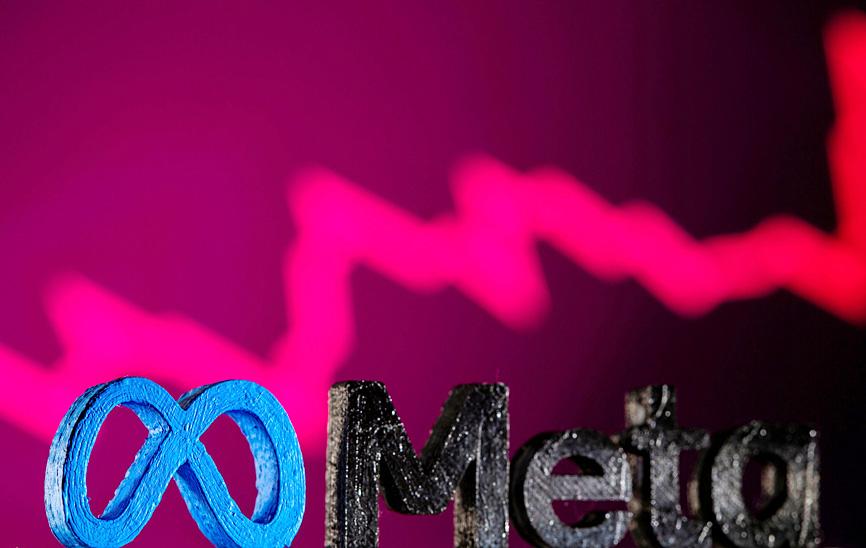Facebook’s parent firm on Thursday opened its Horizon Worlds virtual-reality (VR) platform to the public in North America, in a step toward building its metaverse vision for the future.
Horizon Worlds is far from a fully realized metaverse, a future Internet where online experiences like chatting to a friend would eventually feel face-to-face thanks to VR headsets.
However, headset-wearing users in the US and Canada can now gather with friends or others, play games and build their own virtual worlds on Horizon as long as they are 18 years old and have the proper equipment.

Photo: Reuters
Since last year, a testing version of the platform has been available to a limited number of users.
Facebook renamed its parent company to Meta in October to emphasize its aim to shift from scandal-prone social media platform to its virtual reality vision for its future.
“We want Horizon Worlds to be a safe and respectful environment, so everyone must follow our conduct in VR policy,” Meta said in announcing the opening.
“You have several safety options ... which lets you take a break and then block, mute or report people,” it added.
Meta-owned platforms Facebook and Instagram have been fighting to put behind them a crisis unleashed in September by reams of internal studies leaked to journalists and US authorities by whistleblower Frances Haugen.
The documents underpinned damaging articles that generally argued the firm knew its products could harm users, but chose growth over safety.
The firm’s metaverse push also includes tools for remote working, which has boomed during the COVID-19 pandemic.
Facebook in August unveiled technology for “workrooms,” allowing remote collaboration for people using its Oculus VR gear.
The “Horizon Workrooms” project makes it possible to switch back and forth from virtual reality to Web conferencing to adapt to different situations.

‘SWASTICAR’: Tesla CEO Elon Musk’s close association with Donald Trump has prompted opponents to brand him a ‘Nazi’ and resulted in a dramatic drop in sales Demonstrators descended on Tesla Inc dealerships across the US, and in Europe and Canada on Saturday to protest company chief Elon Musk, who has amassed extraordinary power as a top adviser to US President Donald Trump. Waving signs with messages such as “Musk is stealing our money” and “Reclaim our country,” the protests largely took place peacefully following fiery episodes of vandalism on Tesla vehicles, dealerships and other facilities in recent weeks that US officials have denounced as terrorism. Hundreds rallied on Saturday outside the Tesla dealership in Manhattan. Some blasted Musk, the world’s richest man, while others demanded the shuttering of his

ADVERSARIES: The new list includes 11 entities in China and one in Taiwan, which is a local branch of Chinese cloud computing firm Inspur Group The US added dozens of entities to a trade blacklist on Tuesday, the US Department of Commerce said, in part to disrupt Beijing’s artificial intelligence (AI) and advanced computing capabilities. The action affects 80 entities from countries including China, the United Arab Emirates and Iran, with the commerce department citing their “activities contrary to US national security and foreign policy.” Those added to the “entity list” are restricted from obtaining US items and technologies without government authorization. “We will not allow adversaries to exploit American technology to bolster their own militaries and threaten American lives,” US Secretary of Commerce Howard Lutnick said. The entities

Minister of Finance Chuang Tsui-yun (莊翠雲) yesterday told lawmakers that she “would not speculate,” but a “response plan” has been prepared in case Taiwan is targeted by US President Donald Trump’s reciprocal tariffs, which are to be announced on Wednesday next week. The Trump administration, including US Secretary of the Treasury Scott Bessent, has said that much of the proposed reciprocal tariffs would focus on the 15 countries that have the highest trade surpluses with the US. Bessent has referred to those countries as the “dirty 15,” but has not named them. Last year, Taiwan’s US$73.9 billion trade surplus with the US

Prices of gasoline and diesel products at domestic gas stations are to fall NT$0.2 and NT$0.1 per liter respectively this week, even though international crude oil prices rose last week, CPC Corp, Taiwan (台灣中油) and Formosa Petrochemical Corp (台塑石化) said yesterday. International crude oil prices continued rising last week, as the US Energy Information Administration reported a larger-than-expected drop in US commercial crude oil inventories, CPC said in a statement. Based on the company’s floating oil price formula, the cost of crude oil rose 2.38 percent last week from a week earlier, it said. News that US President Donald Trump plans a “secondary